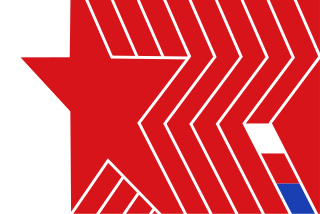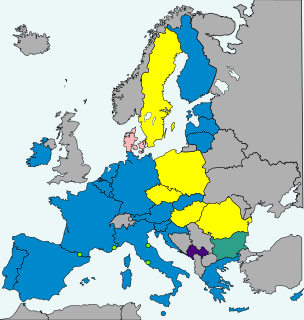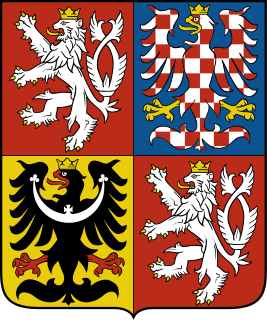
The Communist Party of Bohemia and Moravia is a communist party in the Czech Republic. It has a membership of 42,994 (2016) and is a member party of the European United Left–Nordic Green Left bloc in the European Parliament.

The European Parliament election of 2004 in the Czech Republic was the election of members of the European Parliament (MEPs) representing the Czech Republic for the 2004–2009 term of the European Parliament. It was part of the wider 2004 European election.

The Czech Republic is bound to adopt the euro in the future and to join the eurozone once it has satisfied the euro convergence criteria by the Treaty of Accession since it joined the European Union (EU) in 2004. The Czech Republic is therefore a candidate for the enlargement of the eurozone and it uses the Czech koruna as its currency, regulated by the Czech National Bank, a member of the European System of Central Banks, and does not participate in European Exchange Rate Mechanism II.

The European Parliament election of 2009 in Czech Republic was the election of the delegation from Czech Republic to the European Parliament in 2009. The Civic Democratic Party has won the election with a surprisingly strong lead against the Czech Social Democratic Party. Communist Party of Bohemia and Moravia came third and the Christian and Democratic Union – Czechoslovak People's Party became the last party to enter the Parliament.

The 2017 Czech legislative election was held in the Czech Republic on 20 and 21 October 2017. All 200 members of the Chamber of Deputies were elected and the leader of the resultant government – Andrej Babiš of ANO 2011, became the Prime Minister.

Democratic Union was a liberal political party in the Czech Republic. It existed since 1994 and was dissolved in 2001 when it merged with Freedom Union.

Tomáš Zdechovský is a Czech politician, crisis manager, media analyst, poet and author. In May 2014 he was elected Member of the European Parliament with KDU-ČSL, which is part of the European Peoples Party.
Freedom and Direct Democracy – Tomio Okamura is a hard Eurosceptic, anti-immigration, pro-direct democracy political party in the Czech Republic. The party holds 22 seats in the Czech Chamber of Deputies.
Opinion polling for the 2017 Czech legislative election started immediately after the 2013 legislative election. Monthly party ratings are conducted by Sanep, TNS Aisa, STEM and CVVM.
This page lists nationwide public opinion polls that have been conducted relating to the Czech presidential election, 2018.

Municipal elections were held in the Czech Republic on 13 and 14 November 1998. A total of 62,412 seats were up for election, of which more than 30,000 were won by independent candidates- Voter turnout was 45.02%.

Presidential primaries for the Czech Social Democratic Party were held between 22 October and 25 November 2002 in order to choose the party's candidate for the 2003 presidential election. Miloš Zeman received the highest number of votes. Other candidates were Jaroslav Bureš, Otakar Motejl and Otakar Potůček. Jakub S. Trojan was originally a 5th candidate.

Jiří Drahoš is a Czech physical chemist and politician, who has been Senator for the Prague 4 district since October 2018. Previously, Drahoš served as President of the Czech Academy of Sciences from 2009 to 2017, and was a candidate for the President of the Czech Republic in the 2018 election.
This page lists nationwide public opinion polls that have been conducted relating to the 2003 presidential elections in the Czech Republic.

Plzeň municipal election in 2014 was held as part of Czech municipal elections, 2014. It was held on 10 and 11 October 2014. ANO 2011 received the highest number of votes but Civic Democratic Party (ODS) and Czech Social Democratic Party (ČSSD) won the same number of seats in the City's assembly. Civic Democratic Party ruled in Plzeň more than 20 years but was expected to lose its positions and receive only 10% of votes. In an electoral upset, ODS received more than 17%. Leader of local Civic Democrats Martin Baxa said that he believes that ODS was the actual victor of the election. Voter turnout was 33.73%.
Czech Presidency of the Council of the European Union occurred in the first half of 2009. On 1 January 2009, Czech Prime Minister Mirek Topolánek became the President of the Council of the European Union. When Topolánek's cabinet lost a vote of no-confidence, he was replaced by Jan Fischer on 8 May 2009. Presidency went over to Sweden on 1 July 2009.

The 2019 European Parliament election in the Czech Republic will be held in May 2019, electing the 21 members of the Czech delegation to the European Parliament as part of the European elections held across the European Union.

A by-election for the Zlín Senate seat in the Czech Republic was held on 18 and 19 May 2018 as a result of František Čuba's resignation. The second round was heldr 25 and 26 May 2018. Michaela Blahová and Tomáš Goláň advanced to second round. The election was surprisingly won by Tomáš Goláň. Voter turnout was very low.
From 21 May 2018 to 14 June 2018 the Czech Social Democratic Party (ČSSD) held a referendum to determine whether it should join the minority government of Andrej Babiš with potential confidence and supply from the Communist Party.

Independence Party of the Czech Republic previously called Referendum on the European Union is a Czech Eurosceptic political party founded and led by František Matějka, former member of the Party of Free Citizens.















